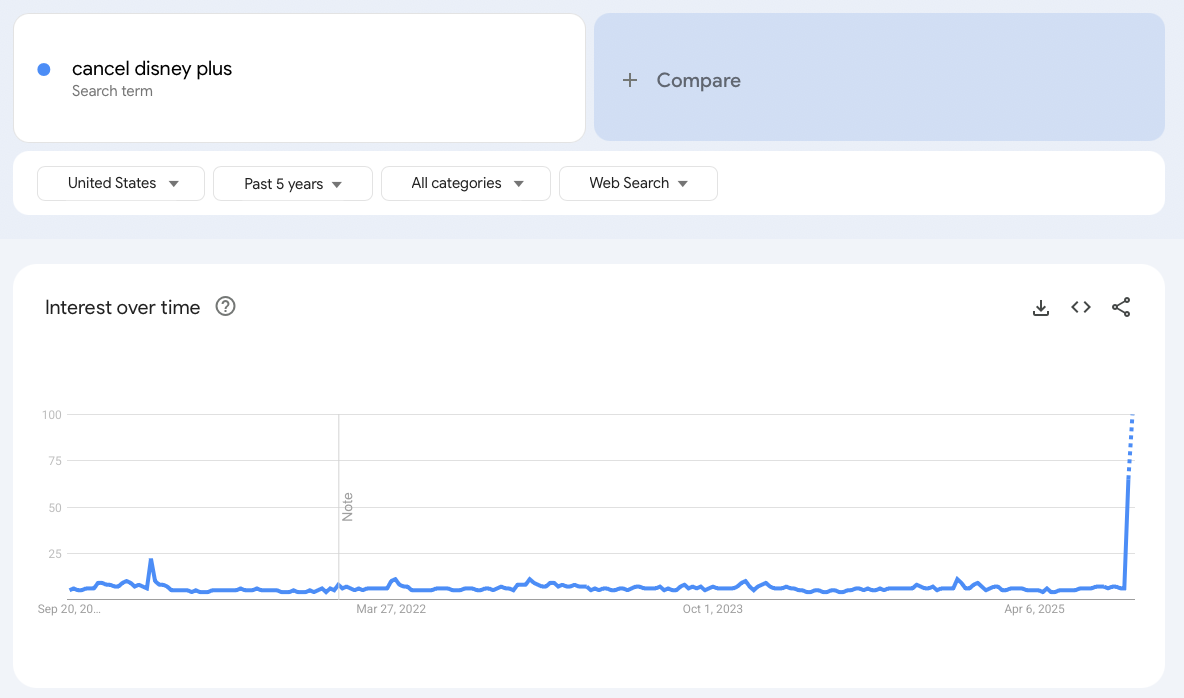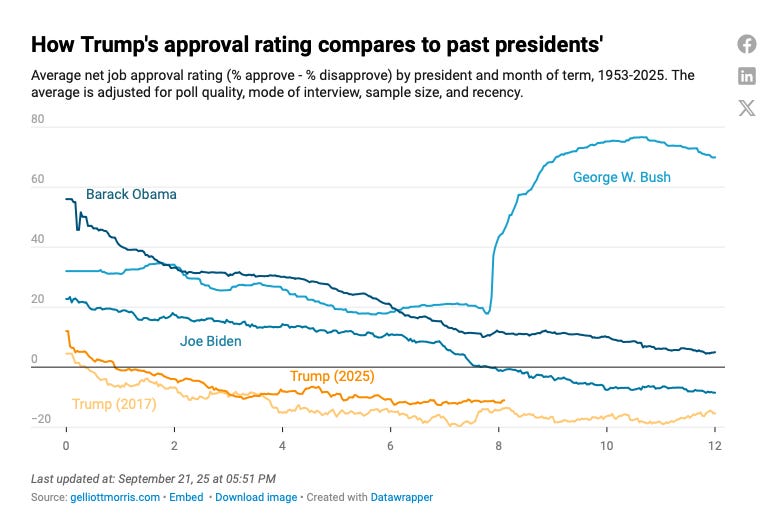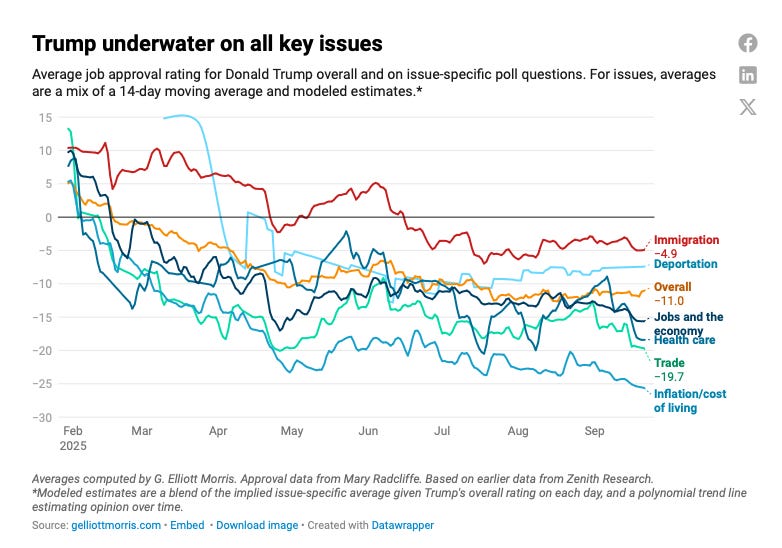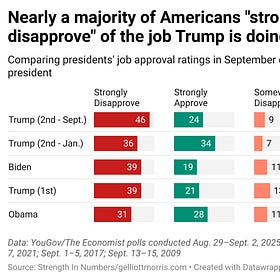A lot of powerful people just don’t realize how unpopular Trump is
The backlash to ABC/Disney canceling Kimmel shows why it's important for businesses and the public to understand that two-thirds of Americans are not Trump voters
Last week, ABC/Disney canceled Jimmy Kimmel’s late-night show after the chairman of the Federal Communications Commission, Brendan Carr, threatened to revoke the broadcast licenses of television stations that carry the program. The backlash has been swift: As I pointed out Saturday morning, search interest for “Cancel Disney+” has hit an all-time high — even higher than the boycott movements from when Disney “went woke” in 2020-2022. The current Disney boycott is now 4x as large as any over the last 5 years, gauged by search interest:
This is not limited to internet posters and Google searchers; investors are worried too. Disney’s stock is down 2% over the last week, while the overall market is up nearly 1%.
This all intersects with a point I’ve been making in this newsletter for a while: many people fundamentally underestimate how unpopular Trump is. As the Disney episode illustrates, they do this at their own peril.
Trump is unpopular
Compare Trump’s topline job approval (-11) to that of other recent presidents, and he stands out quite clearly (not in a good way):
The president’s entire domestic policy agenda is underwater, too — especially on the economy and inflation, the two issues that won him the 2024 election:
But the problem for Trump (and those who ignore the data) runs deeper than the topline indicates. It’s not just that more people disapprove than approve of Trump, but that the disapprovers feel their emotions much, much more intensely. Depending on the polls you pick for your average, between 46 and 50 percent of U.S. adults tell pollsters they “strongly disapprove” of the job Trump is doing as president. That is double the percent that strongly approve (24%):
Trump faces a large intensity gap in his approval rating
On Wednesday, Sept. 3, 2025, the New York Times reported that Donald Trump is trying to get the Republican Party to rebrand its "One Big Beautiful Bill" because the law's poll numbers are so bad. In July, when Congress was taking up the bill, I showed how
Put another way, less than half of the people who voted for Trump in 2024 currently “strongly approve” of his presidency.
A lot of non-voters hate Trump
Yet, consumer-facing companies keep siding with Trump. Why? Regulatory pressure is one explanation: Maybe Disney/ABC really are worried about Brendan Carr taking local station licenses, more than they're worried about audiences and attention. And other companies have behaved similarly: Paramount did what it apparently needed to do to get a merger with Skydance through Carr’s FCC, too. And Target very publicly rolled back lots of corporate DEI policies this spring.
But a broadcast license doesn’t really help you if you have nobody to broadcast to. By siding with Trump, ABC alienated a large portion of its audience. This is similar to what happened to Target: it marginalized its consumer base and saw a precipitous decline in sales in Q2 this year.
The actions of each company are perplexing. Of particular note is that these firms are worth billions of dollars, with some of the most expensive lawyers in the world. Experts say ABC could have won its suit against the FCC — and, for that matter, the case against George Stephanopoulos that it settled for $15M last year. Paramount-Skydance settled an even more frivolous case against CBS News/60 Minutes when it didn’t need to, especially when it offered up Stephen Colbert as a sacrifice to Trump and Carr anyway.
From what I can tell, executives at these companies are making a simple statistical mistake that is imperiling their decision-making: They are assuming that all U.S. adults, in 2025, look like U.S. voters in 2024. Let’s do some quick math:
53%: Trump’s topline disapproval in our polling average today
48%: The percent of U.S. adults who “strongly disapprove” of Trump’s job as president.
49.8%: The share of the vote Trump won among voters in 2024
Now, you could say that since 49.8% is bigger than 48% — or, similarly, that Kamala Harris only won 48.3% of the vote in 2024 — then to keep the public on your side, you need to do whatever the 49.8% wants. But this ignores a crucial fourth statistic:
64.1%: The share of voting-eligible adults who turned out to vote in 2024
That’s right, not all adults voted in 2024. To calculate the share of adults who voted for Trump, you need to multiply the percentage of adults who voted by the percentage of people who voted for Trump:
64.1 * 0.498 = 31.9%
That gives us 32%. So:
Under a third of American adults are Trump voters
53% of adults are Trump disapprovers — with 48% intensely opposed
It’s not hard to see how making decisions for the former, pissing off the latter, would be bad for business. Elections reward coalitions of voters, while markets respond to consumers — voters and non-voters — whose preferences show up not just on Election Day, but in audience ratings, subscription revenue, purchases (like trips to Disney World), etc. If a president is unpopular with the broader public (and not just the out-party), you should expect friction for brands, platforms, and legacy media that appear to bend toward him.
Support independent journalism!
This article is brought to you by paying members of Strength In Numbers.
Independent journalism is crucial for holding people in power accountable to the facts and figures, and to the public. In our current fight for democracy, the role of the journalist is to draw attention to these trends and to fight for the people.
Join us in our fight for facts and democracy:








